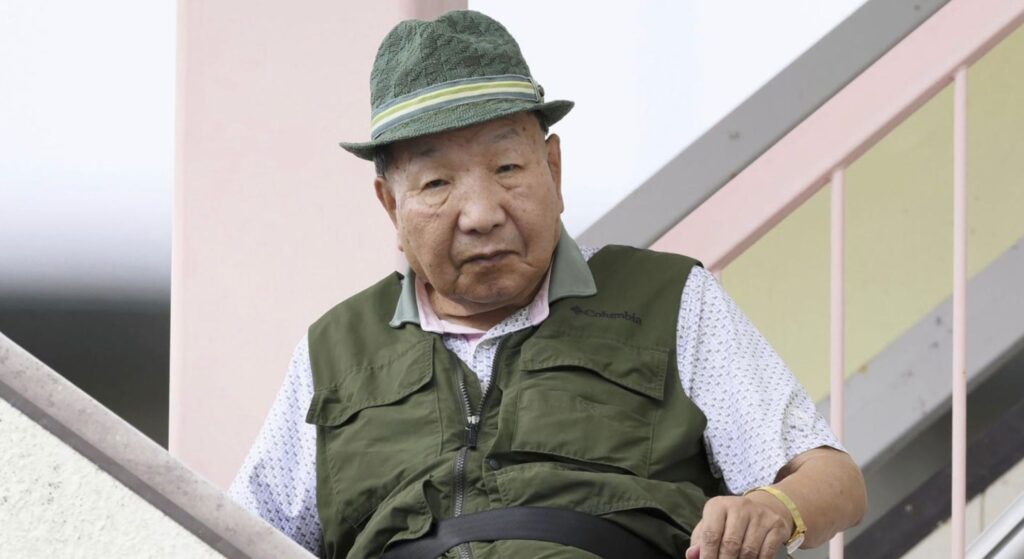Hakamada Iwao was in jail for 46 years for a crime committed in 1968. Then, he was pronounced not guilty. The reason? Fabricated evidence.
The now-88-year-old man was recently acquitted by a Japanese court on Thursday, September 26, 2024, after a retrial of his quadruple murder case where it was found that the evidence presented against him was fabricated.
Hakamada, who was on death row for almost 50 years, was placed on death row in 1968 after he was found guilty of murdering his boss, his boss’ wife, and their two children. In 1966, the bodies of the four individuals were recovered following a fire at their home in Shizuoka
Hakamada Iwao, at 30 years old, was a former professional boxer working at a miso processing plant at the time. On June 30, 1966, a fire started at the house of one of his bosses and he had helped extinguish this fire. There, he discovered the corpses of his boss and his family, who were all stabbed to death.
The authorities have pointed to him and accused him of murdering the family, committing arson, and stealing 200,000 yen.

According to report by the BBC, the Japanese man denied all these allegations, but later on said that he was coerced to confess after a series of beatings and interrogations that lasted for, at most, 16 hours a day for over 23 days. A pair of bloodied pajama pants, among other bloody clothing, also pointed to Hakamada as the suspect.
2 years after the crime, he was convicted of quadruple murder and arson and was given the death sentence. In 1980, Hakamada appealed to the Tokyo High Court and the Supreme Court of Japan on his case, which he was both denied, and his death sentence was upheld.
Hakamada had spent 30 years in prison in solitary confinement, like most death row inmates.
Hakamada, his legal team, and supporters have repeatedly asked for a retrial of his case a number of times over the years. His case was also backed by the Japanese Federation of Bar Associations, where his lawyers concluded that any of the clothing presented as evidence was not established to be owned by Hakamada.
A request for a retrial made in 1994 was denied by the Shizuoka District Court, after 13 years of gathering evidence. In 2004, the Tokyo High Court also denied Hakamada a retrial.
In 2007, Kumamoto Norimichi, one of the judges that convicted Hakadama in 1968, came out to campaign for Hakamada’s innocence, after doubting the authenticity of his confession. This sparked a campaign for Hakamada’s retrial in 2008, which was headed by Amnesty International and Japan Pro Boxing Association.
In the same year, a DNA test found that the blood on the clothing that was used as evidence did not match Hakamada’s. Still, the Supreme Court once again denied the retrial request, stating that “neither the original nor new evidence provided any reasonable doubt” of his guilt.
Further tests were done in 2011, and in 2012, it was revealed that the blood did not match Hakamada’s DNA. The prosecution was said to have contested the validity of these tests.
In 2014, Hakamada was released from prison and was finally granted a retrial by the Shizuoka District Court. By this time, the court stated that there was reason to believe that the evidence presented in the first trial was fabricated and that keeping the then 78-year-old waiting for a retrial would be “unbearably unjust.”
In 2023, a retrial of Hakamada’s case was ordered by the Tokyo High Court.
Hakamada’s mental health had taken a “heavy toll” during his time in solitary confinement and the looming threat of being put to death, according to his family. His sister, Hideko, has been taking care of Hakamada Iwao ever since he was released from prison and said that “finally a weight has been lifted from my shoulders,” when the case was re-opened.
Hideko also said in an interview with CNN that Iwao had been “living in his own world” after decades of solitary confinement.
Then, on September 26, 2024, 56 years after he was arrested, Hakamada Iwao was found not guilty of the crimes alleged against him. Hakamada Iwao is the fifth death row inmate to have been acquitted in post-war Japan.
He was the world’s longest-serving death row inmate. Sadly, with almost five decades lost, the fact that he’s now free from the death sentence might not register that much to him.
Other POP! stories you might like:
‘Hostile behavior’ that forces employees to resign is ‘constructive dismissal’ – Supreme Court
Naomi Campbell banned from serving as charity trustee after firm found to be misusing funds
Instagram users furious as some of their archived stories vanish, old videos reduced to stills
Classical music lovers rise: New music from Mozart coming in hot
‘Fake’ Brad Pitt arrested after scamming two women in Spain

